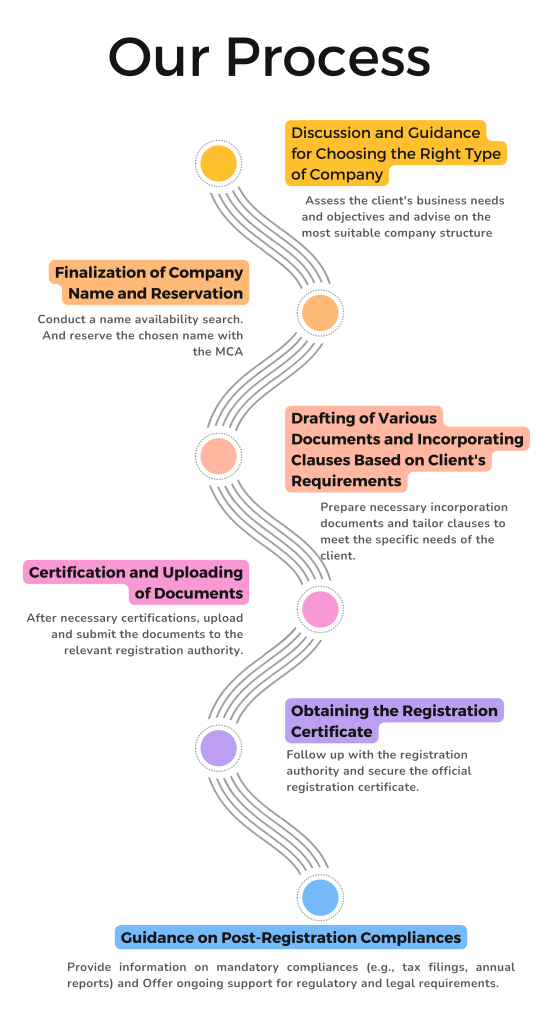Private Company Registration

Embark on your entrepreneurial journey with confidence by registering your private company through our streamlined and hassle-free process. At Biswas FinLegal, we specialize in simplifying the complexities of private company registration, ensuring compliance with all legal requirements while providing personalized guidance at every step. Whether you’re launching a startup or restructuring an existing business, our team of experts is dedicated to making your registration experience seamless. From name reservation and document preparation to obtaining your Certificate of Incorporation, we handle everything with precision and professionalism, so you can focus on what matters most – growing your business.
Choosing Biswas FinLegal means choosing a partner committed to your success. Our comprehensive services include meticulous documentation, expedited processing, and ongoing support to help your business thrive. We understand the importance of a solid foundation, and our tailored solutions ensure your private company is registered quickly and correctly. With transparent pricing, no hidden fees, and a team of knowledgeable professionals, we provide exceptional value and peace of mind. Join countless satisfied entrepreneurs who have trusted us with their private company registration, and take the first step towards achieving your business goals today.
In order to promote the expansion and growth of India’s economy, the Central Government decided to replace the Companies Act of 1956 with a new legislative framework that would better align with the evolving economic environment on both domestic and global scales. This helps the Private Limited Company registration becomes more affordable and easy, with many exceptions
A Private Limited Company is a legal structure where the business is a separate legal entity from its owners, known as shareholders. The liability of shareholders is limited to the amount invested in the company, protecting personal assets. Private Limited Companies have several advantages, such as limited liability, ease of raising funds through the sale of shares, and continuity of existence.
Biswas Filing is a business registration and compliance management service provider. We are a group of Chartered Accountants, Company Secretaries and Advocates based in Thiruvananthapuram. Our aim is to register start-ups, micro, small and medium business at an affordable cost, by limiting our charges, in order to provide a support for the budding businesses. We are delivering a wide range of services to the business enterprises in Kerala, including Company Registration, Limited Liability Partnership Registration, Partnership Firm Registration, OPC Registration, GST Registration and Filing, Accounting and Book Keeping Services and Filing .
2. Apply for DIN (Director Identification Number)
3. Reserve your unique Name
4. Form SPICe (INC-32)
5. e-MoA (INC-33) and e-AoA (INC-34)
6. PAN and TAN Application
2. Passport / VotersID/ Driving License of all
3. Latest Bank Statement of All
For Registered Office
Building Tax Receipt
Latest KSEB Bill of Registered Office
MOA reveals the name, aims, objectives, registered office address, clause regarding limited liability, minimum paid up capital and share Capital of the Company. In short, it explains the relationship of a Company with the Outside world.
2. Go to ‘MCA Services’ tab.
3. In the drop-down click on ‘View Company/LLP Master Data’.
4. Enter the companies CIN.
5. Enter the captcha code. Click on ‘Submit’.
6.Now you will be able to view the exact status of your registration process.
2. Makes you look serious and attracts more customers.
3. Creates better image and credibility in the market.
4. Easier to get bank credit and investment from investors.
5. Creates faith in employees and easy to attract talented manpower.
6. It is very convenient to exit or sell the business, due to less documentation and cost.
Restricting Outsiders
After Private Limited Company Registration, whenever a shareholder wants to transfer his shares, he must first offer them to the existing members of the Private Limited Company. The price of the shares is determined by the directors. It is done so as to preserve the family nature of the Private Limited Company’s shareholders.
Separate Management
The members may derive profits without being burdened with the management of the company. They do not have effective and intimate control over its working and they elect their representatives as Directors on the Board of Directors of the company to conduct corporate functions through managerial personnel employed by them.
Perpetual Succession
Unlike partnership, the shares of a member in a Private Limited Company can be transferred without the consent of other members. An incorporated company never dies, except when it is wound up as per law. A company, being a separate legal person is unaffected by death or departure of any member and it remains the same entity, despite total change in the membership. Perpetual succession, means that the membership of a company may keep changing from time to time, but that shall not affect its continuity.
Pricing
Our Packages
start-up
(for Resident Indian Citizens. NRI's / Foreign Nationals may contact customer care)₹25,500/Monthly
- Name Reservation
- Company Registration
- Stamp Duty
- 2 Digital Signatures
- 2 Director Identification Numbers
- MOA and AOA
- PAN and TAN
- GST Registration
- PF and ESI Registrations
- Bank Account Opening Support
- Start-up Registration
- Certificate of Commencement of Business
start-up+
(for Resident Indian Citizens. NRI's / Foreign Nationals may contact customer care)₹30,000/Monthly
- Name Reservation
- Company Registration
- Stamp Duty
- 2 Digital Signatures
- 2 Director Identification Numbers
- MOA and AOA
- PAN and TAN
- GST Registration
- PF and ESI Registrations
- Bank Account Opening Support
- Certificate of Commencement of Business







